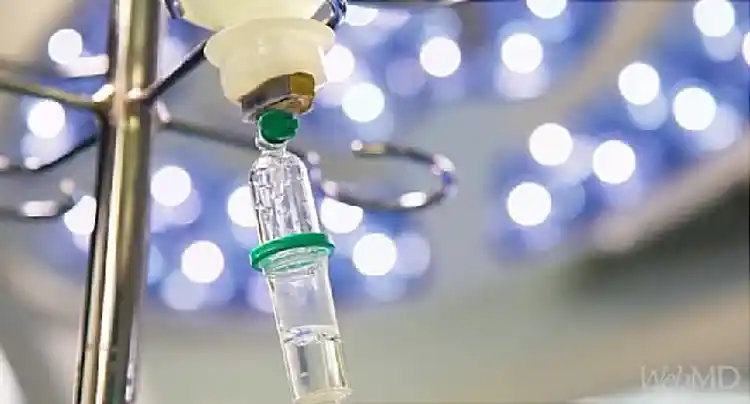Treatment Options for Prostate Cancer

Hide Video Transcript
Video Transcript
[MUSIC PLAYING]
We have hormone therapies, different types of chemotherapy.
We have radiopharmaceuticals. We have immunotherapy. And so as we go through the toolbox, my goal is to let the patient know that there are many, many treatment options.
Many men hear the concept of hormone therapy and they think that we're actually going to give them hormones. Well, not really. Hormone therapy, or androgen deprivation therapy, simply means that we're removing testosterone from the man's body.
Prostate cancer cells feed off of testosterone. And so either through surgery or other medicines, we're able to reduce that level of testosterone in their bodies.
This can be done surgically, where the testicles are removed by the urologist. That dramatically decreases the amount of testosterone in the body. More commonly, we use injections or other medicines that turn the body's mechanism of producing testosterone down-- in many cases, completely off.
IV chemotherapy has been very important. It was initially utilized in the later stages. We now know that if we move those treatments up along with testosterone decrease, that men can have increases of more than two years in their disease trajectory and life expectancy.
For advanced prostate cancer in some instances, radiation can be part of a multidisciplinary approach. By combining radiation with hormone therapy, some men can actually have long control of their disease and a much extended life expectancy.
Radiation is also used in a palliative approach. And what we mean by that is if people have areas of pain or discomfort, radiation can be utilized to help with those areas, maybe not in a curative fashion but definitely to improve their quality of life.
There are many different types of immunotherapy. One major treatment developed with prostate cancer utilizes a person into bone white cells in order to fight prostate cancer. Those cells are introduced to proteins from prostate cancer cells. And then those cells are reintroduced back into a person's own body. That is for a very, very small subset of the population. That can include patients that have metastatic disease but don't have symptoms, or they don't have pain.
So although there's a great excitement and hope about that treatment, for many patients, we have not been able to utilize it because of symptoms or because of the extent of their disease.
The decision for a treatment plan is very much a team effort.
I often say, this is a marathon.
What is the goal that you have? What is a personal goal for you? And that helps us to craft a treatment regimen that works for everyone as best as we can do.
BRADLEY CARTHON
I'll often speak of a toolbox. And what I mean by that is that as we go through this journey, there are going to be many things that we can utilize. We have hormone therapies, different types of chemotherapy.
We have radiopharmaceuticals. We have immunotherapy. And so as we go through the toolbox, my goal is to let the patient know that there are many, many treatment options.
Many men hear the concept of hormone therapy and they think that we're actually going to give them hormones. Well, not really. Hormone therapy, or androgen deprivation therapy, simply means that we're removing testosterone from the man's body.
Prostate cancer cells feed off of testosterone. And so either through surgery or other medicines, we're able to reduce that level of testosterone in their bodies.
This can be done surgically, where the testicles are removed by the urologist. That dramatically decreases the amount of testosterone in the body. More commonly, we use injections or other medicines that turn the body's mechanism of producing testosterone down-- in many cases, completely off.
IV chemotherapy has been very important. It was initially utilized in the later stages. We now know that if we move those treatments up along with testosterone decrease, that men can have increases of more than two years in their disease trajectory and life expectancy.
For advanced prostate cancer in some instances, radiation can be part of a multidisciplinary approach. By combining radiation with hormone therapy, some men can actually have long control of their disease and a much extended life expectancy.
Radiation is also used in a palliative approach. And what we mean by that is if people have areas of pain or discomfort, radiation can be utilized to help with those areas, maybe not in a curative fashion but definitely to improve their quality of life.
There are many different types of immunotherapy. One major treatment developed with prostate cancer utilizes a person into bone white cells in order to fight prostate cancer. Those cells are introduced to proteins from prostate cancer cells. And then those cells are reintroduced back into a person's own body. That is for a very, very small subset of the population. That can include patients that have metastatic disease but don't have symptoms, or they don't have pain.
So although there's a great excitement and hope about that treatment, for many patients, we have not been able to utilize it because of symptoms or because of the extent of their disease.
The decision for a treatment plan is very much a team effort.
I often say, this is a marathon.
What is the goal that you have? What is a personal goal for you? And that helps us to craft a treatment regimen that works for everyone as best as we can do.
